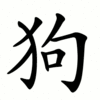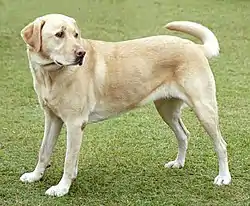狗
See also: 豿
| ||||||||
Translingual
| Stroke order | |||
|---|---|---|---|
| Stroke order | |||
|---|---|---|---|
 | |||
Han character
狗 (Kangxi radical 94, 犬+5, 8 strokes, cangjie input 大竹心口 (KHPR), four-corner 47220, composition ⿰犭句)
Derived characters
- 𭲉, 𬍉, 𬍌, 𮏛, 𤟳
References
- KangXi: page 709, character 12
- Dai Kanwa Jiten: character 20345
- Dae Jaweon: page 1121, character 22
- Hanyu Da Zidian (first edition): volume 2, page 1341, character 5
- Unihan data for U+72D7
Chinese
| simp. and trad. |
狗 | |
|---|---|---|
| alternative forms | 豿 “cub” 㺃 | |
Glyph origin
| Historical forms of the character 狗 | ||
|---|---|---|
| Warring States | Shuowen Jiezi (compiled in Han) | Liushutong (compiled in Ming) |
| Chu slip and silk script | Small seal script | Transcribed ancient scripts |
 |
 |
 |
Characters in the same phonetic series (句) (Zhengzhang, 2003)
| Old Chinese | |
|---|---|
| 勾 | *koː, *koːs |
| 鉤 | *koː |
| 鴝 | *koː, *ɡo |
| 句 | *koː, *koːs, *kos, *ɡo |
| 夠 | *koː, *koːs, *kʰoː |
| 枸 | *koː, *koːʔ, *koʔ |
| 軥 | *koː, *koːs, *ɡo |
| 狗 | *koːʔ |
| 苟 | *koːʔ |
| 岣 | *koːʔ, *ko |
| 笱 | *koːʔ |
| 玽 | *koːʔ |
| 耇 | *koːʔ |
| 豿 | *koːʔ, *qʰroːɡ |
| 敂 | *koːʔ |
| 怐 | *koːs, *kʰoːs, *qʰoːs, *kos |
| 雊 | *koːs |
| 竘 | *kʰoːʔ, *kʰoʔ |
| 齁 | *qʰoː |
| 呴 | *qʰoːʔ, *qʰos |
| 蚼 | *qʰoːʔ, *ɡo |
| 豞 | *qʰoːs |
| 訽 | *qʰoːs, *ɡoːs |
| 佝 | *qʰoːs |
| 拘 | *ko |
| 駒 | *ko |
| 眗 | *ko |
| 跔 | *ko |
| 鮈 | *ko |
| 痀 | *ko |
| 蒟 | *koʔ, *kos |
| 絇 | *kos, *ɡo |
| 邭 | *kos |
| 劬 | *ɡo |
| 朐 | *ɡo |
| 鼩 | *ɡo |
| 斪 | *ɡo |
| 翑 | *ɡo |
| 葋 | *ɡo |
| 姁 | *ɡo, *qʰo, *qʰoʔ, *qʰos |
| 欨 | *qʰo, *qʰoʔ |
| 喣 | *qʰoʔ |
| 煦 | *qʰoʔ, *qʰos |
| 昫 | *qʰos |
Phono-semantic compound (形聲, OC *koːʔ) : semantic 犬 (“dog”) + phonetic 句 (OC *koː, *koːs, *kos, *ɡo).
Etymology
From some language ancestral to modern Hmong-Mien languages, from Proto-Hmong-Mien *qluwˣ (“dog”), perhaps from Proto-Austronesian *(u-)(ŋ)kuɣkuɣ (“dog”) (Norman, 1988; Benedict, 1996).
Alternatively, STEDT derives this from Proto-Sino-Tibetan *d-kʷəj-n (“dog”), whence also 犬 (OC *kʰʷeːnʔ).
Less likely, it may be related to 駒 (OC *ko, “foal”), 羔 (OC *kluː, “lamb”), 𤘽 (“calf”) (Wang, 1982).
Pronunciation
Definitions

狗
狗
- dog (Classifier: 隻/只 m c mn; 條/条 m)
- (derogatory) something or someone unpleasant
- Used as an attributive.
- (neologism) As a self-deprecatory term for a certain group of people.
- (Hong Kong, neologism, derogatory) police; pig; po-po
- (chiefly Beijing) to flatter
- (obsolete) cub; young bear or tiger
- a surname
Synonyms
- (dog):
Dialectal synonyms of 狗 (“dog”) [map]
- (Hong Kong: police): 警犬 (jǐngquǎn)
Compounds
Derived terms from 狗
|
|
|
See also
References
- “Entry #4345”, in 臺灣閩南語常用詞辭典 [Dictionary of Frequently-Used Taiwan Minnan] (in Chinese and Min Nan), Ministry of Education, R.O.C., 2011.
- Peyraube, Alain. "Ancient Chinese." The Cambridge Encyclopedia of the World's Ancient Languages. Ed. Roger D. Woodard. Cambridge UP, 2004. 1012.
Japanese
Vietnamese
Han character
狗: Hán Việt readings: cẩu (
狗: Nôm readings: cẩu[1][3][5]
- This term needs a translation to English. Please help out and add a translation, then remove the text
{{rfdef}}.
References
- Nguyễn et al. (2009).
- Trần (2004).
- Bonet (1899).
- Génibrel (1898).
- Taberd & Pigneau de Béhaine (1838).
This article is issued from Wiktionary. The text is licensed under Creative Commons - Attribution - Sharealike. Additional terms may apply for the media files.